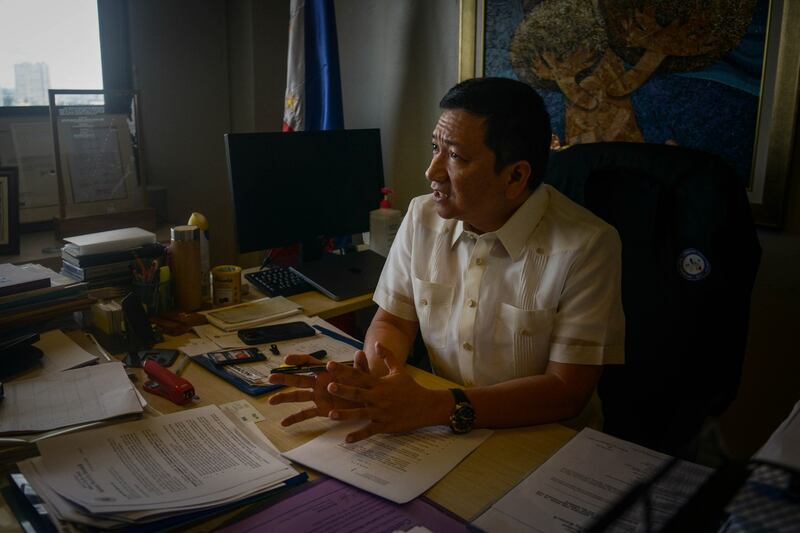China has protested against the passage of a draft law on maritime zones in the South China Sea by the Philippine Senate.
The upper house of the Philippine’s legislature on passed the so-called Maritime Zones Act on Feb. 26. The lower house approved a similar bill last May.
The act defines Philippine maritime zones in line with the ruling of the Permanent Court of Arbitration, or PCA, in 2016 that invalidated China’s sweeping claims in the South China Sea.
Six parties claim parts of the South China Sea but Beijing’s claim, visualized by the so-called nine-dash line, encircles almost 90% of the sea including all the islands and reefs inside.
Chinese Foreign Ministry spokeswoman Mao Ning told reporters in Beijing that the act "has attempted to further enforce the illegal arbitral award on the South China Sea by domestic legislation."
She said that the act “severely violates China’s territorial sovereignty and maritime rights and interests in the South China Sea” by including the Scarborough Shoal, which is called Huangyan Dao in China, most islands and reefs of the Spratly archipelago (Nansha Qundao in Chinese), and their adjacent waters into its maritime zones.
“China firmly opposes it and has lodged solemn démarches to the Philippines,” the spokeswoman said.
Mao made scathing remarks about the 2016 PCA tribunal which, she said, Manila unilaterally initiated without the Chinese government’s prior consent and is therefore deemed “illegal” by Beijing.
“China neither accepts nor participates in that arbitration, neither accepts nor recognizes the award, and will never accept any claim or action arising from the award,” she reiterated.
Significant law
Tensions have been rising between Beijing and Manila over Scarborough Shoal and the Second Thomas Shoal – two of the disputed reefs that lie within the Philippines’ exclusive economic zone (EEZ), also known as the West Philippine Sea.
By international law, an EEZ gives a state exclusive access to the natural resources in the waters and seabed.
On Tuesday, Manila said four Filipino crew members were injured when China Coast Guard ships used water cannons to block Philippine vessels taking supplies to a military outpost at the Second Thomas Shoal, known as Ayungin in the Philippines.
President Ferdinand Marcos Jr. said afterwards that the event was “alarming” and that “we cannot view this in any way but the most serious way.”
Since the news emerged about the passage of the Maritime Zones Act at the Senate on Monday, “there have been comments from some columnists or opinion makers from other countries criticizing it,” said Jonathan Malaya, Assistant Director General of the Philippine National Security Council, not directly referring to Mao Ning’s statement.

“But this is a sovereign act of the Philippines,” Malaya said, “It doesn’t matter what other countries say.”
“The significance of this law is that it implements in domestic legislation the decision of the Permanent Court of Arbitration in the Hague,” the senior official told Radio Free Asia.
“It’s important for the Philippines to enshrine this decision in domestic law which further strengthens our legal position in territorial disputes in the West Philippine Sea,” he added.
The two versions of the bill, by the two chambers of the Philippine Congress, will now be reconciled before being sent to President Marcos who would then sign the bill into law.
“This is part of a wider national strategy for the West Philippine Sea, a vital step of protecting the sovereign rights of the Philippines by ensuring that international maritime law is synchronized with domestic law,” said Aries Arugay, a visiting senior fellow at the ISEAS Yusof-Ishak Institute in Singapore.
After the law on maritime zones, lawmakers are likely to propose a bill on archipelagic sea lanes, and even an anti-foreign interference bill, according to the political scientist.
“Half of the Senate will be up for grabs [in an election] next year,” said Arugay. “Our legislators now think that taking a more pro-Philippines assertive stance in the West Philippine Sea may get them re-elected.”
“Before, foreign policy issues have never been electoral issues but while some Filipinos may think this is an issue far from their daily lives, when they see the high prices of fish they can immediately connect that with the inability of fishermen to get fish in the South China Sea,” he explained.
“So the South China Sea/West Philippine Sea can be, if not already is, a gut issue for many Filipinos.”
Edited by Mike Firn and Taejun Kang.
